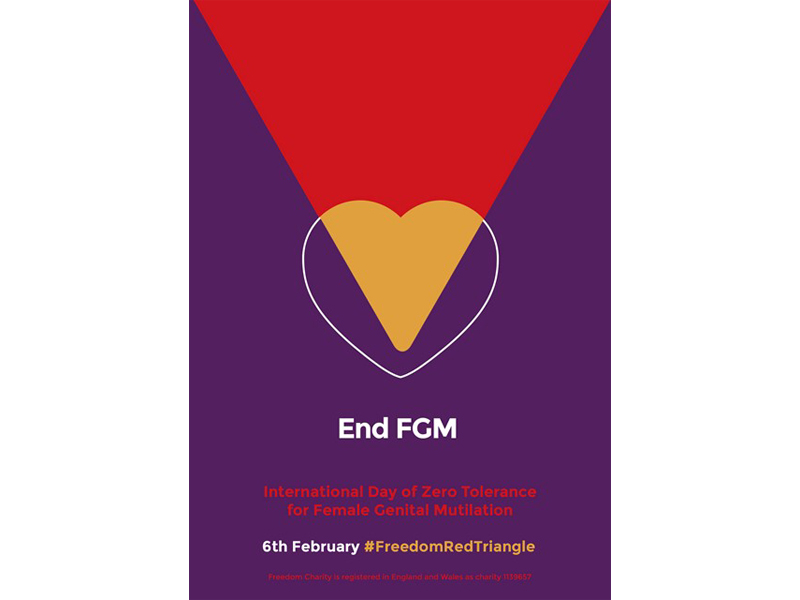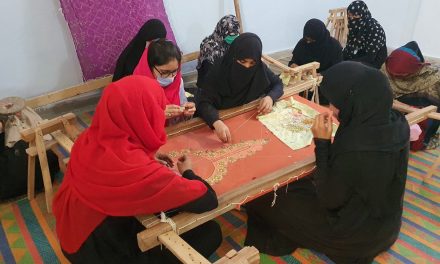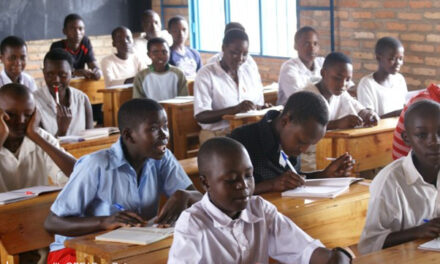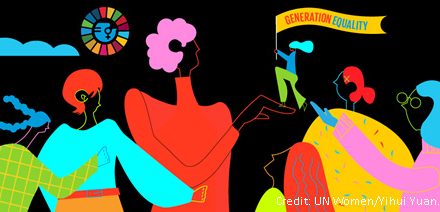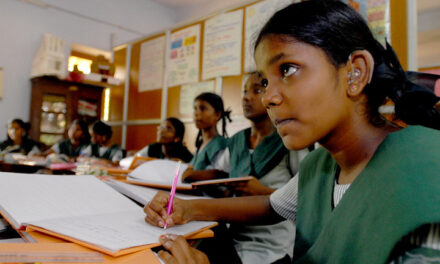This blog was written by Dr Geraldine Hutchinson FRSA, non-executive director and trustee of multi-academy trusts and charities, including the Freedom Charity. Geraldine has worked in education for more than 30 years and champions equity of access to education for vulnerable groups in the UK and internationally.
What is the scale of Female Genital Mutilation (FGM) both internationally and in the UK (where it has been illegal since 1985)? Why is International Day of Zero Tolerance for FGM so important this year and how has the COVID-19 pandemic affected the situation?
In 2012, the United Nations General Assembly designated February 6th as the International Day of Zero Tolerance for Female Genital Mutilation (FGM). In 2015, 193 governments agreed to eradicate FGM by 2030 as part of the commitment to meet the Sustainable Development Goals (SDGs). SDG 5 focuses on gender equality and Target 5.3 is the primary focus of the work of the Freedom Charity – to eliminate all harmful practices, such as child and forced marriage and female genital mutilation.
Founded in 2009 by Aneeta Prem, Freedom Charity actively educates against forced marriage in schools and universities, and across the medical and legal professions in the UK. Most importantly, Freedom Charity rescues and supports victims of FGM, operates a 24/7 help line for emergency support, and has designed a mobile app for victims to use. In the last 10 years, Freedom Charity has achieved significant milestones, positively impacting on changing mindsets about FGM and the law. Freedom Charity raises the profile of FGM and forced marriage, as all too often, these issues go together and are ‘not talked about’.
FGM comprises all procedures that alter or injure the female genitalia for non-medical reasons and is recognised internationally as a violation of the human rights and health of girls and women. FGM is a criminal offence and constitutes child abuse in many countries, including the UK. While FGM has been illegal in the UK since 1985, research estimated that in 2015, there were over 100,000 women and girls resident in the UK, who have been subjected to FGM. Legislation introduced in 2015 made the reporting of FGM in girls under 18 years mandatory.
Girls who undergo FGM experience severe pain, shock, excessive bleeding, infection, difficulty in passing urine, as well as, long-term consequences for their sexual, reproductive and mental health. The exact number of girls and women worldwide who have undergone FGM remains unclear, however data for 31 countries with representative data on prevalence, indicates that this equates to at least 200 million girls and women alive today. The practice of FGM had reduced pre-COVID-19, however, it remains a global problem, and will more than likely have increased as a result of the pandemic.
Although the practice of FGM is more concentrated in 30 countries in Africa and the Middle East, UNICEF Data Monitoring of FGM reporting in February 2020, noted that more than 500,000 women and girls in the US have undergone FGM or are at risk of FGM. In Australia, more than 50,000 women and girls have been cut, while an estimate of 600,000 have undergone FGM in Europe. In the UK, 137,000 women and girls have been cut and more than 67,000 are at risk.
Following the introduction of the Serious Crime Act in 2015, mandatory reporting by regulated professionals provides data on any known cases of FGM. NHS data collected in England between April 2019 to March 2020 by health care professionals, acute hospitals, mental health providers and GP practices, reported that there were 6,590 women and girls who either had a procedure to treat their FGM, or were identified as having undergone FGM previously when they were treated
Unfortunately, the scale of the task to meet SDG 5.3 to eliminate FGM has been negatively affected by COVID-19, especially as school closures and lack of supervision increases girls’ susceptibility to this practice. A joint UNFPA/UNICEF report has calculated that two million additional cases of FGM will now need to be prevented to eliminate FGM by 2030.
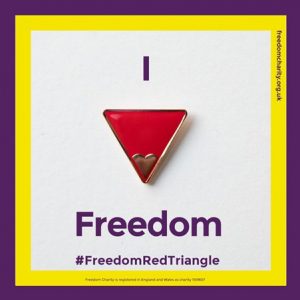 The work of Freedom Charity to eliminate FGM – is symbolised by the Red Triangle, which is an international symbol for FGM, designed by Freedom. The Charity has worked with more than 250 schools, numerous universities and with multi-agency professionals (the police, lawyers, medics, midwives and social workers) using successful strategies to educate about FGM and forced marriage. Lesson plans available to schools meet the needs of the revised Personal, Social, Health and Economic Education (PSHE) curriculum, implemented in schools in England from September 2020.
The work of Freedom Charity to eliminate FGM – is symbolised by the Red Triangle, which is an international symbol for FGM, designed by Freedom. The Charity has worked with more than 250 schools, numerous universities and with multi-agency professionals (the police, lawyers, medics, midwives and social workers) using successful strategies to educate about FGM and forced marriage. Lesson plans available to schools meet the needs of the revised Personal, Social, Health and Economic Education (PSHE) curriculum, implemented in schools in England from September 2020.
Two books authored by Aneeta Prem – ‘But It’s Not Fair’, specific to Forced Marriage, and ‘Cut Flowers’ specific to FGM, support Freedom’s education strategy. More than 50,000 books have been distributed to schools across the four nations of the UK. Using these stories, teachers explore issues in a sensitive way, encouraging boys and girls to understand the long-term consequences on the health and mental well-being of women and girls. The impact of FGM on a girl’s body stays with the victim for all of her life, impacting on her sexual and reproductive health and on her ability to survive giving birth to a healthy baby.
50,000 books have been distributed to schools across the four nations of the UK. Using these stories, teachers explore issues in a sensitive way, encouraging boys and girls to understand the long-term consequences on the health and mental well-being of women and girls. The impact of FGM on a girl’s body stays with the victim for all of her life, impacting on her sexual and reproductive health and on her ability to survive giving birth to a healthy baby.
We know from the data profiled in this blog and from the impact of COVID-19 in 2020 and 2021, that the risks of FGM are ever present and that education plays a significant part in preventing it. The countdown to 2030 is fast approaching and our mission at Freedom Charity remains – to eliminate FGM across the world.
Freedom Charity is a UK registered charity number 1139657
Hashtags for social media sharing: #Act2EndFGM #FreedomRedTriangle #FGM

